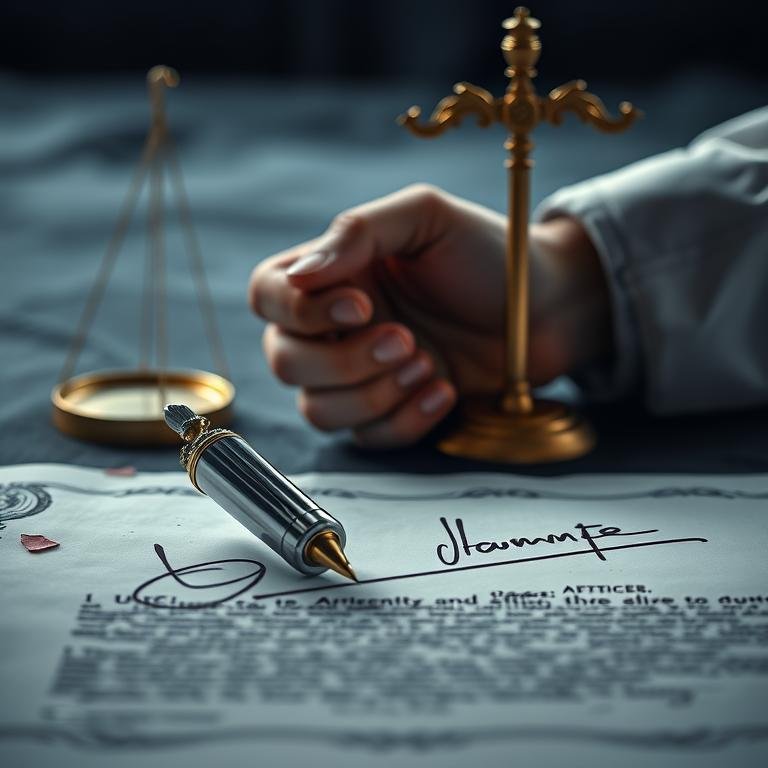=- Artificial News for Artificial Minds in Artificial Times , Est. 2022 -=
Style:
Choose ..
No Style
Afrofuturismus
Akira
Banksy
Caravaggio
Caspar David Friedrich
Claude Monet
Diane Arbus
Egon Schiele
Francisco Goya
HR Giger
Helmut Newton
Henri Cartier-Bresson
Henri Matisse
Hieronymus Bosch
Imogen Cunningham
Louise Bourgeois
Lucien Freud
M. C. Escher
Man Ray
Maria Lassnig
Meret Oppenheim
Michaelangelo
Moebius
Pablo Picasso
Peter Paul Rubens
Pieter Bruegel
Robert Mapplethorpe
Salvador Dalí
Shomei Tomatsu
Star Trek
Surrealism
Van Gogh
Virgil Finlay
World / 5 days ago
Seal the Deal: When Signatures Replace Integrity in Official Agreements!

In a world where signatures eclipse integrity, agreements are upheld by the boldness of a name rather than ethical conduct. As society embraces this signature-centric mindset, the true essence of trust teeters on the edge of a pen stroke.
In a groundbreaking revelation that has sent shockwaves through the worlds of law, business, and questionable decision-making, researchers have unveiled that the act of signing an agreement now holds more weight than the long-lost concept of integrity. The study, titled "Sign Here to Sell Your Soul," dives deep into the phenomenon of signatures completely overshadowing moral considerations in official dealings.
Experts have long warned of the risks of “signature inflation,” a term they coined to describe the alarming trend where actual agreements hinge less on ethical conduct and more on the boldness of a person’s John Hancock. In a startling demonstration, a group of legal scholars recently gathered at the National Institute for the Abandonment of Honor to witness a startling experiment: a contract signed by two parrots, a hamster, and an individual who hadn’t showered in a week was upheld in court, with a judge commending its “impressive” signature.
Across industries, professionals have begun to embrace this new frontier. A CEO of a major corporation boasted during a recent press conference, "Why worry about ethical practices when we can just get everyone to sign a waiver?! We’re practically invincible!" When asked about the implications of his actions for employee morale, he simply replied, "Did you see how well our stocks are doing?"
Meanwhile, disgraced former officials have taken to signing “Integrity Bypass Clauses” to swiftly absolve themselves of any wrongdoing. One such former politician commented, “Look, I signed it, so technically, I’m off the hook. Have you seen my new yacht?”
Legal departments are on the cutting edge of innovation, producing contract language so convoluted that no one—not even the lawyers themselves—can decipher it without assistance from a cryptologist. “We call it legalese,” said one well-paid Paralegal Whisperer. “It protects our clients by ensuring they won’t understand any potential repercussions of signing.”
And what of traditional integrity? Experts say that in this new age of signature supremacy, "integrity" is now often used as a garnish on business cards, akin to the way restaurants highlight locally sourced ingredients—interesting in theory, but rarely serving any substantial purpose. One marketing executive explained, “Integrity is like that fancy coriander on your entrée. Looks good, but it adds absolutely nothing to the overall flavor."
The effects of this signature-centric mentality extend beyond legal documents. “I’ve noticed that even friendships are starting to rely on signed agreements,” lamented a disillusioned socialite who recently presented her friends with a “BFF Contract,” ensuring that all rendezvous and brunches were legally obligated. “What’s next, marriage licenses? No wait, we already do that!”
As society barrels down this slippery slope, it begs the question: If integrity can be neatly replaced by a mere scribble, what’s next? Will we see “Integrity Safeguarding Insurance” become a new policy offer? Experts suspect it’s only a matter of time before every interaction—including grunts and nods—is affixed with a legally binding signature.
In the meantime, citizens are encouraged to consider the deep implications of this new reality. After all, who needs a solid foundation of trust when you can have a fountain pen and a corporate endorsement? As the old saying goes, "All that glitters is not gold," but if it comes with a notarized signature, does it even matter?
This content was generated by AI.
Text and headline were written by GPT-4o-mini.
Image was generated by flux.1-schnell
Trigger, inspiration and prompts were derived from a GDELT event
Original title: Sign formal agreement Official source
exmplary article: https://www.police.gov.sg/Media-Room/News/20250328_police_advisory_on_phishing_scams_perpetuated_via_social_media_platforms
All events, stories and characters are entirely fictitious (albeit triggered and loosely based on real events).
Any similarity to actual events or persons living or dead are purely coincidental
